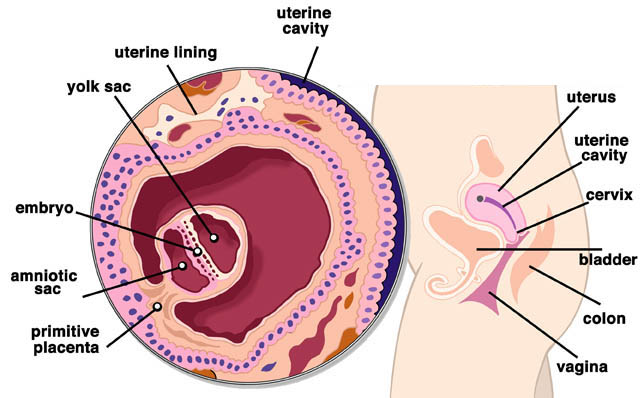4 Weeks Pregnant
Related Articles
External Links
- This article has no external links.
A little bit of the science stuff
Congratulations! The chances are that if you're 4 weeks pregnant, you've just found out you're expecting. In your fourth week, some cells inside the embryo have clumped together at the centre, while others have been forced to the edge, leaving a space inside. The embryo is known as the blastocyst at this point. It has found its way to the womb and is ready to embed itself into the lining of the uterus (the endometrium). Cells are burrowing into the endometrium, forming microscopic fingers of tissue known as chorionic villi. Now the blastocyst can start producing human chorionic gonadotropin, or hCG - or the hormone that can be detected by pregnancy tests.
4 weeks pregnant - your symptoms
At four weeks pregnant you may still be totally unaware that your body is preparing to nurture and carry your baby for the next 8 months. There is a long way to go, but the early stages of the placenta and umbilical cord are already there; these will play a vital role in sustaining your baby through your pregnancy. Remember, the sex of your baby has already been determined, but you probably won't have the chance to find out what it is until your twenty week scan, so don't start planning the nursery colour scheme just yet!

How you are feeling
Taking a pregnancy test now should confirm your pregnancy but you may have been alerted through other symptoms at four weeks pregnant. The most obvious is that you will now be missing a period, but only if you had a consistent 28 day cycle in the first place. For lots of women who live with longer or unpredictable cycles there are other signs that alert them. Very often women report that they simply feel different at this stage, maybe tired, nauseous, or a little emotional. Sometimes, it's just something you cannot put your finger on. Physically, it is common to find that your breasts feel more sensitive than usual or that your nipples have gone darker or appear slightly larger. Don't worry if you haven't noticed any of these though, it is important that you understand now that the term 'normal' in pregnancy can encompass a very broad spectrum of possibilities. Many women experience none of these early symptoms and some even sail right through the first trimester without realising that they are pregnant at all.
What you need to do
Once a test confirms your pregnancy you should make an appointment to see your doctor. They will refer you to your local antenatal team and from here you will have regular appointments with a midwife. Ensuring that you receive good antenatal care is very important to ensure you give your baby the best possible start in life. Have you been taking a folic acid supplement? It is recommended that women begin taking folic acid ahead of conceiving as this is thought to reduce the risk of premature delivery. Don't panic though if you haven't been taking it, it is not too late to start and you can find it very easily at any pharmacist or in many supermarkets. Taking it during your first trimester will reduce the chances of your baby being born with a problem such as spina bifida or congenital heart disease.
| << Fertilisation | 5 Weeks Pregnant >> |